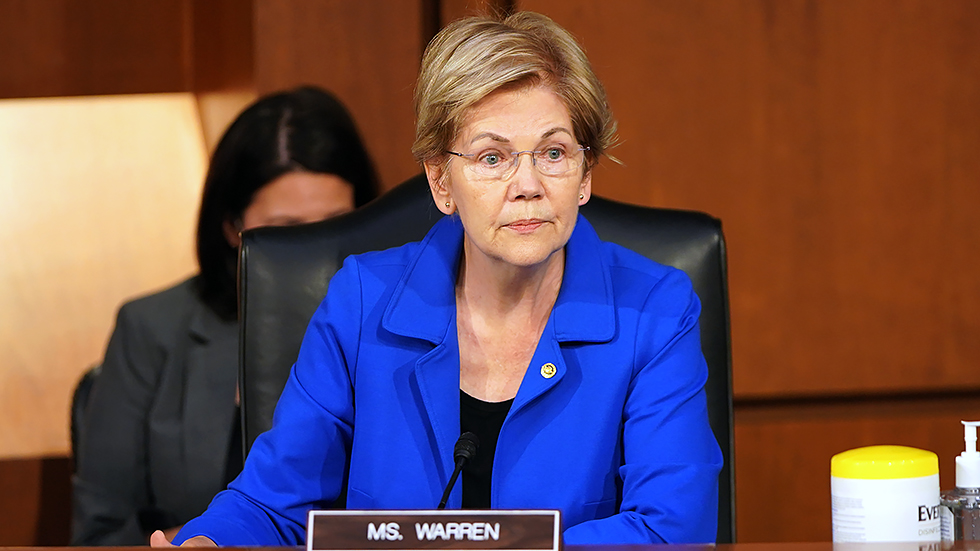Equilibrium/Sustainability — PR public employees protest for better pay

Today is Friday. Welcome to Equilibrium, a newsletter that tracks the growing global battle over the future of sustainability. Subscribe here: digital-stage.thehill.com/newsletter-signup.
Puerto Rican public school teachers are leading the island’s public employees — including firefighters and policemen — in walkouts and demonstrations demanding higher pay, The New York Times reported.
“They don’t value us,” special education teacher Jessica Colón Cartagena told the Times. “We don’t mean anything to politicians.”
Starting salaries for Puerto Rico’s teachers are $1,750 a month, while their base pay remains stagnant for 13 years, according to the Times. In comparison, firefighters start at $1,500, with their base pay stagnant for 22 years.
The island’s governor, Pedro R. Pierluisi (D), has been less than sympathetic, describing the walkouts as “shirking one’s duty” and suggesting that the employees “can protest and march outside of work hours.”
But by Thursday, with protests in San Juan’s streets, Pierlusi had offered to raise teacher pay to $2,700 a month — halfway to the teachers’ demands of $3,500.
Today we’ll look at New York’s Fashion Week, which is colliding with a push by the state’s Democrats to make the financial industry disclose its true costs. Then we’ll look at a broader deadlock over disclosure at the Securities and Exchange Commission (SEC) which is divided over whether to pursue strictness — or safety — in the upcoming climate disclosure rules investors are demanding.
For Equilibrium, we are Saul Elbein and Sharon Udasin. Please send tips or comments to Saul at selbein@digital-stage.thehill.com or Sharon at sudasin@digital-stage.thehill.com. Follow us on Twitter: @saul_elbein and @sharonudasin.
Let’s get to it.
NY Fashion Week weighs industry’s footprint

New York Fashion Week, taking place from Friday through Wednesday, is expected to “be unlike any before,” with smaller shows, pandemic-related precautions and “emerging talents with non-traditional takes” on what future fashion events could look like, according to Vogue.
But this week also comes amid potential big changes for the “fashion capital of the United States” — rolling in just a month after a pivotal “Fashion Sustainability and Social Accountability Act” advanced in both chambers of the state legislature, Yahoo News reported.
First words: “For far too long the fashion industry has worked in a little black box with far too little accountability,” State Sen. Alessandra Biaggi (D), a Bronx resident and co-sponsor of the bill, told the Bronx Times.
“As a global fashion and business capital of the world, New York state has a moral responsibility to serve as a leader in mitigating the environmental and social impact of the fashion industry,” she added.
Disclosure, due diligence and justice: The dual bills, A8352 and S7428, would require “fashion retail sellers and manufacturers to disclose environmental and social due diligence policies,” while creating a community benefit fund to finance environmental justice projects.
The legislation would be the first in the country to mandate such disclosure from the fashion industry, according to the Bronx Times.
Both the state senate and assembly versions of the bill were introduced in October and sent to their respective Consumer Protection committees in January.
What are some specifics? Retailers and manufacturers that do business in New York and have annual receipts of at least $100 million would need to disclose their supply chains, detail their environmental and social footprint and set binding targets for decreasing those impacts, the Bronx Times reported.
Companies would also need to disclose materials they use and wages that workers receive. If they didn’t, they would face fines which would pay into a community benefit fund, according to the Times.
Among the “greatest contributors” to climate change: The fashion industry generates 2 to 8 percent of global carbon emissions via energy- and water-intensive cotton-growing processes and shipments of raw materials to “energy-hungry factories,” Yahoo News reported, citing a United Nations Environment Program (UNEP) study.
There’s also water pollution: Fabric-dyeing is the second-biggest polluter of water worldwide, while textiles cause about 9 percent of microplastic ocean pollution each year, according to a second UNEP document referenced by Yahoo.
‘FASHION IS OFTEN SAID TO BOTH REFLECT AND LEAD CULTURE’
Some industry leaders are already “asking for regulations,” Assembly Member Anna Kelles (D) — cosponsor of the bill — told Yahoo, identifying Stella McCartney as one such example.
Social media plays a role: Instagram has seen a 36-percent increase in interest in eco-friendly purchases from 2021 to 2022, with “an uptake in up-cycling and thrifting as Gen Z re-think their carbon footprint,” according to Marie Claire. Also on the rise is “vintage fashion,” particularly when promoted by Instagram influencers, Marie Claire reported.
At Copenhagen Fashion Week earlier this month, organizers relied “on sustainability and TikTokers for revival, with an emphasis on “often minimalist, easy to wear clothes,” according to Vogue Business.
Counterpoint: could sustainable fashion be a myth? Kenneth Pucker, a senior lecturer at Tufts University’s Fletcher School, questioned the fashion industry’s billing of “recycling, resale, rental, reuse, and repair…as environmental life savers” in a recent opinion piece for Harvard Business Review.
The fashion sector has long found it easier to predict demand for styles launched seasonally rather than monthly, leading to accumulating inventories and markdowns, he explained, describing this trend as a “hedonic treadmill.”
Pucker characterized the level of speed that drives the sector as “outdated and quaint,” while criticizing the reliance of brands “on fossil fuel-based synthetic materials that are cheaper, adaptable and more widely available than natural materials.”
Last words: Calling out the fashion industry’s insistence on touting innovative approaches while failing “to lessen its planetary impact,” Pucker said this dichotomy should be “a loud wake up call” for those keen on addressing climate change.
“Fashion is often said to both reflect and lead culture — the industry has a once-in-history opportunity to demonstrate that creativity and respect for boundaries can lead to authentic sustainability,” he added.
SEC Dems divided over climate disclosure

Sen. Elizabeth Warren (D-Mass.) sent a fiery letter on Thursday to the Securities and Exchange Commission (SEC), which has been caught in a protracted political deadlock among its Democratic members over its upcoming climate rules.
First words: “These delays are unwarranted and unacceptable, and violate the commitment, which you made seven months ago,” Warren wrote in a letter to SEC Chair Gary Gensler, as reported by Reuters.
“The absence of a rule leaves shareholders and investors in the dark about the significant long- and short-term climate risks facing public companies,” she added.
Behind the lines: Warren’s letter comes in response to reporting earlier this week from Bloomberg that the SEC’s Democrats — Gensler and his fellow commissioners Allison Herren Lee and Caroline Crenshaw — are deadlocked over the question of how strict and far-reaching companies’ disclosure of their impact on, and risk from, climate change should be.
That debate has caused the SEC’s publication of its long awaited guidelines to be repeatedly delayed.f
How late are they? Gensler had initially promised results — which large investors like Vanguard and Black Rock have been clamoring for — by October 2021, which the commission then delayed till January, and now March, Reuters reported.
Warren is demanding “a clear timeline” from Gensler by February 23, Bloomberg reported.
The Massachusetts senator isn’t the only frustrated progressive: With “climate-fueled disasters” already “devastating communities …it is absolutely unacceptable for the Securities and Exchange Commission to delay the rule-making process for climate risk disclosure any further,” said Jamal Raad of Evergreen Action in a statement Tuesday.
“Investors must be armed with the information they need to understand their own exposure to climate risk,” Raad added.
A BREAKDOWN AROUND TACTICS — AND OVER WHAT’S ‘MATERIAL’
At its broadest level, the dispute among Commissioners Gensler, Herren Lee and Crenshaw concerns whether Democrats should pass the strongest rule possible — or the safest one, Bloomberg reported.
Gensler: ‘Go safe.’ Given that any rules passed by the SEC will likely be challenged immediately in court by business groups, Gensler reportedly wants to make sure those rules stick closely to accepted definitions of “materiality,” as Bloomberg wrote earlier this week.
What’s that? Materiality is a vital but somewhat vague concept that pertains to information which would be relevant to an investor’s decision about whether to invest in or divest from a given company.
As we saw in last week’s Senate confirmation hearings for Federal Reserve nominee Sarah Bloom Raskin, conservatives are likely to argue that a company’s exposure to physical and regulatory risks around climate isn’t material to investors — or at least that such factors aren’t within the SEC’s regulatory purview.
Gensler wants the SEC to take a relatively conservative approach that will stand up in court — rather than risk having the whole rule struck down, as Bloomberg reported.
Herren Lee and Crenshaw counter: ‘Go strong.’ On the other side, Gensler’s fellow Democrats argue that the SEC should use its considerable authority to make companies disclose the maximum amount — including the emissions of the consumers who use their products, known as Scope 3 emissions.
Herren Lee and Crenshaw also want the SEC to require that climate information, like other information the SEC requires, be verified by independent auditors.
Why are those things important? More limited forms of disclosure, like those in which companies only have to count their own operations and supply chain, mean that a company like ExxonMobil can claim to be going net-zero — while neglecting the billions of tons of CO2 released every year by people using their primary product.
And independent audits are popular with climate hawks in part because companies’ ambitious claims about climate-friendly goals often fall far short of the reality — with a recent study finding that 25 major companies’ “net-zero” pledges in fact would only lead to an average of 40 percent in emissions cuts, as our colleague Zack Budryk reported.
On the other hand: Adding those requirements raises the costs for companies to comply — something that companies often sue the SEC over, Bloomberg reported.
Last words: The SEC should swing for the fences, former commissioner Robert Jackson Jr. told Bloomberg.
The agency’s “policy choices should be driven by their conviction about how best to protect investors, not lobbyists’ self-interested speculation about what randomly chosen federal judges might say when industry inevitably sues,” he added.
Follow-up Friday

Turning back to issues we’ve explored throughout the week.
Conservative Ontario premier losing patience with ‘trucker’ protests
- Ontario premier and leader of the Progressive Conservative Party Doug Ford declared a state of emergency in attempt to end what he called a “siege” at the bridge between Detroit and Windsor, Ontario by anti-vaccine protesters claiming to be truckers, according to Canada’s Global News. The protest was “not representative of our truckers,” Ford said, who were a minority at the ongoing blockade.
Dr. Evil to fight climate change on Super Bowl Sunday
- On Thursday, we brought tidings that Sunday’s Super Bowl LVI could be the hottest NFL championship yet. For the same event, the actors of Austin Powers have reconnected after more than 20 years for a General Motors gametime ad — in which Dr. Evil will be on a mission to fight climate change, E! Online reported.
France to build six new nuclear reactors
- Also on Thursday, we looked at a breakthrough in nuclear fusion, a futuristic source of emission-free power that “fuses” atoms together — unlike “fission,” which splits them apart and generates radioactive waste. But in France, President Emmanuel Macron announced plans to build six new nuclear fission reactors, seen as an attempt to counter claims that the technology is costly and unsafe, The Wall Street Journal reported.
Please visit The Hill’s sustainability section online for the web version of this newsletter and more stories. We’ll see you on Monday.
Copyright 2023 Nexstar Media Inc. All rights reserved. This material may not be published, broadcast, rewritten, or redistributed. Regular the hill posts












